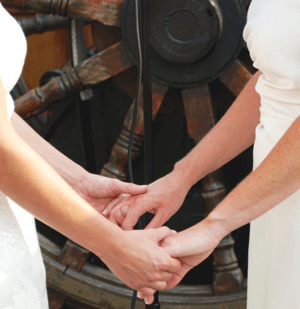By: Lisa Keen/Keen News Service—
For the eighth time this year, a state has declared that same-sex couples have the right to marry. On Thursday, the New Mexico Supreme Court ruled unanimously that state laws that “have the effect of precluding same-gender couples from marrying” violate the equal protection guarantee of the state constitution.
“We hold that the State of New Mexico is constitutionally required to allow same-gender couples to marry,” wrote the court, “and must extend to them the rights, protections, and responsibilities that derive from civil marriage under New Mexico law.”
The ruling not only makes New Mexico the 17th state plus the District of Columbia to provide marriage equality for same-sex couples, it represents a new milestone: As 17th, it marks one-third of the 50 states, and its population puts more than one-third of the country’s population as living under marriage equality laws.
”Today’s decision by the New Mexico Supreme Court is a powerful affirmation that same-sex couples are equal members of New Mexico’s diverse culture and must be given the same legal protections and respect as other families,” said Shannon Minter, legal director of the National Center for Lesbian Rights (NCLR), which pressed the lawsuit with the ACLU.
Lambda Legal, which has itself pressed many such lawsuits, hailed Thursday’s ruling, saying, “This beautiful unanimous decision explicitly underscores the argument we and our sister organizations have long made: denying same-sex couples the ability to marry imposes significant emotional and dignitary harm and is discrimination, pure and simple.”
New Mexico does not have a law explicitly banning same-sex couples from marrying. But five same-sex couples were denied licenses in Albuquerque, and the ACLU and NCLR filed the lawsuit, Greigo v. Oliver, in March. A district court judge ruled in favor of the couples in August, and clerks in several counties begun issuing marriage licenses. In its decision, the state supreme court noted that, by the time of the oral argument in October, “over 1,466 marriage licenses had been issued” to same-sex couples in the state.
The decision, penned by Justice Edward Chavez, took pains to discuss the plaintiff couples in everyday terms, mention their children, and explain how the inability to marry negatively impacted them.
“The inability to legally marry has adversely impacted several of the Plaintiff couples who have endured significant familial and medical hardships together,” wrote Chavez. “On one occasion, when Rose [Griego] was hospitalized, the hospital refused to provide Kim [Kiel] with any information about Rose’s condition or treatment until Rose’s other family members arrived, despite the fact that it was Kim who took Rose to the hospital.”
Referring to the U.S. Supreme Court’s ruling in June, striking down the key provision of the Defense of Marriage Act (DOMA) in U.S. v. Windsor, the opinion said, “Interpreting our statutes to authorize committed same-gender couples to enter into civil marriage will grant them the rights and privileges available to opposite-gender married couples in approximately one thousand statutes and federal regulations that refer to a person’s marital status, thereby avoiding a constitutional challenge on that basis.”
“The purpose of the New Mexico marriage laws,” wrote Chavez, “is to bring stability and order to the legal relationships of committed couples by defining their rights and responsibilities as to one another, their property, and their children, if they choose to have children.”
In reaching its decision, the court concluded that the laws preventing same-sex couples from marrying treat people differently because of their sexual orientation and that courts should examine such laws using an intermediate level of scrutiny — more than mere rational scrutiny, less than strict scrutiny. The court said “the LGBT community is a discrete group that has been subjected to a history of purposeful discrimination, and it has not had sufficient political strength to protect itself from such discrimination.”
“When fundamental rights are affected by legislation, the United States Supreme Court has applied strict scrutiny when determining whether the legislation is constitutional,” wrote the court. “However, regarding marriage, the United States Supreme Court does not demand ‘that every state regulation which relates in any way to the incidents of or prerequisites for marriage must be subjected to rigorous scrutiny.’” It also noted that the U.S. Supreme Court in U.S. v. Windsor “left unanswered the level of scrutiny it was applying to same-gender marriages.”
“We conclude from the United States Supreme Court’s equivocation in these cases that whether the right to marry is a fundamental right requiring strict scrutiny is a question that remains unanswered,” wrote Chavez. “We do not need to answer this question here because Plaintiffs prevail when we apply an intermediate scrutiny level of review under an equal protection analysis.” According to the court, under intermediate scrutiny, the state offered no sufficient reason for denying same-sex couples the right to marry.
© 2013 Keen News Service. All rights reserved.








